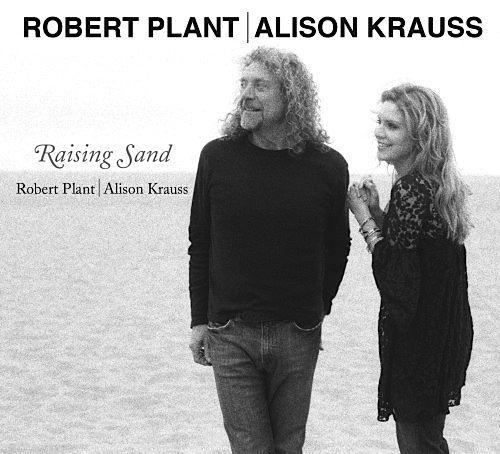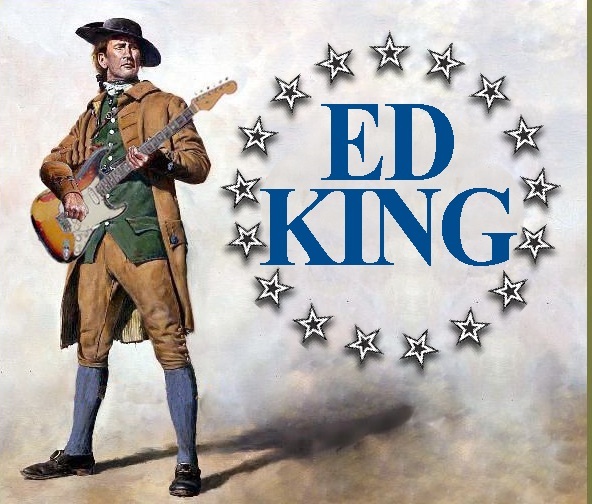
 BY ED KING ROCK EXPERT Today I set out to listen to and share my thoughts on the Robert Plant/Alison Krauss album, Raising Sand. This collaboration, which the artists have taken great pains to say is not an album of “duets,” was produced by T-Bone Burnett. I’ve been looking forward to hearing it in its entirety. I must note that unlike most of my Insta-Reviews, I couldn’t help but hear snippets of some of these songs on the artists’ recent radio interviews, but I’ll try to keep my thoughts as fresh as possible. You have counted on me to fire from my gut, and with 2 eggs over light and a few strips of bacon still rattling around in my innards, I’m in tune with that ample part of my anatomy.
BY ED KING ROCK EXPERT Today I set out to listen to and share my thoughts on the Robert Plant/Alison Krauss album, Raising Sand. This collaboration, which the artists have taken great pains to say is not an album of “duets,” was produced by T-Bone Burnett. I’ve been looking forward to hearing it in its entirety. I must note that unlike most of my Insta-Reviews, I couldn’t help but hear snippets of some of these songs on the artists’ recent radio interviews, but I’ll try to keep my thoughts as fresh as possible. You have counted on me to fire from my gut, and with 2 eggs over light and a few strips of bacon still rattling around in my innards, I’m in tune with that ample part of my anatomy.
“Fortune Teller”: Right from the start, producer T-Bone Burnett’s deliberate, futuristic-retro hands are all over the production of this chestnut. It sounds like it’s more of a set-up piece than all that this collaboration promises. Is Krauss anywhere to be found other than on the backing vocal tracks? Cool guitar solo.
“Gone, Gone, Gone”: I love this Everly Brothers song! Just seeing the title scroll across the Phawker Radio player gets me excited. Plant and Krauss sound good, but what happened to the groovy beat of the Everlys’ orginal? Burnette’s insistence on seeing through his musical designs can be his strength as well as his weakness as a producer (think the ups and downs of Sam Phillips’ Martinis and Bikinis. Watch it, T-Bone! When this version needs to cut loose and hit a new dynamic, the same beat and grinding rhythm guitar carry on, as if programmed in long before any of the players got cooking in real time. Not bad, though, not bad.
“Killing the Blues”: Here’s a tender ballad featuring sweet harmony; pedal steel guitar; and a low, twangy guitar solo. Folk Scientist Burnette lets the musicians play on this one without the need to adhere to any grand concept. AAA radio was built on such dignified takes on earlier works. Maybe getting old’s not so bad!
“Let Your Loss Be Your Lesson”: Krauss takes the lead on this track, and this woman’s got pipes! The guitar work is really nice, which I’m finding is a consistent theme throughout this album. I guess Plant is sitting this one out.
“Sister Rosetta Goes Before Us”: This track’s got that straw hat/overalls rolled up/bare feet in the pond feel. I’m afraid of it. Mischievous boys should be whitewashing a picket fence. T-Bone probably wore suspenders while producing this one. Plant looks stupid with a waxed handlebar mustache. Don’t get me wrong – this is a beautiful little song, but I have no business listening to it.
“Please Read the Letter”: Is this Robert Plant singing lead or the early Bee Gees? How did he make his voice sound like that? Come on, Valania, you snuck in a 1967 Bee Gees track, no? (Good ear, Ed! — The Editor) I’ve got a certain degree of musical credibility to uphold. I’m absolutely loving this track, but I feel like a fool including it in my review of a Robert Plant-Alison Krauss album. Buyer beware!
“Polly Come Home”: Phawker Radio is not loading this song for me, so I’ll carry on.
“Stick With Me Baby”: I sense an inspirational number coming. In the hands of ’80s-era Rod Stewart this would be headed toward a tear-jerking wagon ride with 10-year-old Mick Hucknall. But hey, we’re talking about dignified, classy Robert Plant and Alison Krauss, a queen of modern-day bluegrass, if I know anything about that genre. They play it close to the vest, let the song be nothing more than a low-key mood piece that’s gone before I’m done typing this paragraph. Bravo!
“Through the Morning, Through the Night”: Krauss takes the lead on this country ballad, joined by Plant on harmonies. This is yet another restrained, natural track, with Burnette playing curator more than sound sculptor. People go ga-ga over those Neko Case records, which tend to sound like these tracks but with heaps of reverb thrown atop everything. Give it to me dry, baby! Excess reverb is a veil. Plant and Krauss have nothing to hide. (Damn, I feel like I’m maturing just by listening to this album.)
“Your Long Journey”: Here’s one of those folky songs that allows the musicologist in us all to stroke our salt-and-pepper beards and note the link between Celtic and Appalachian musical traditions. I like to drink my beer at room temperature, you know. Don’t get me wrong, I really do enjoy this exercise in folk harmonizing, but I can’t shake the fact that Robert Plant is one half of this collaboration. We’re 10 tracks into this album and Plant’s yet to shake his moneymaker. Where’s that crawlin’ kingsnake? Methinks there’s a hint of penance in Plant’s participation in this album. Or is this just part of the maturation process?
“Trampled Rose”: Based on the title alone, you <em>know</em> this one’s gonna be tender and heartfelt! Phawker Radio is having difficulties loading this number, so I’ll move on for now.
“Rich Woman”: Here we go, a song with some badass attitude! Plant’s on the move and Krauss is keeping with him sultry step by sultry step. This one’s a real winner. What’s it doing way down in the running order? Perhaps putting it up too early in the sequence would promise more of the same. Are we headed back to those tender mercies numbers? No, that’s all folks!
To recap, I’d been hoping to get a little more rise in my jeans out of his collaboration, but it’s hard to argue with the taste that went into making this album. Since the demise of Led Zeppelin he’s proved himself a dedicated and tasteful lover of music. All the artists Zeppelin used to cite as influences obviously run deep in Plant’s heart to this day. I knew nothing about Krauss, and she seems worth hearing on her own albums. Would I buy this album? I don’t know. I’m not sure it would go with my coffee table, but it may look good sitting on yours through the holiday season.
